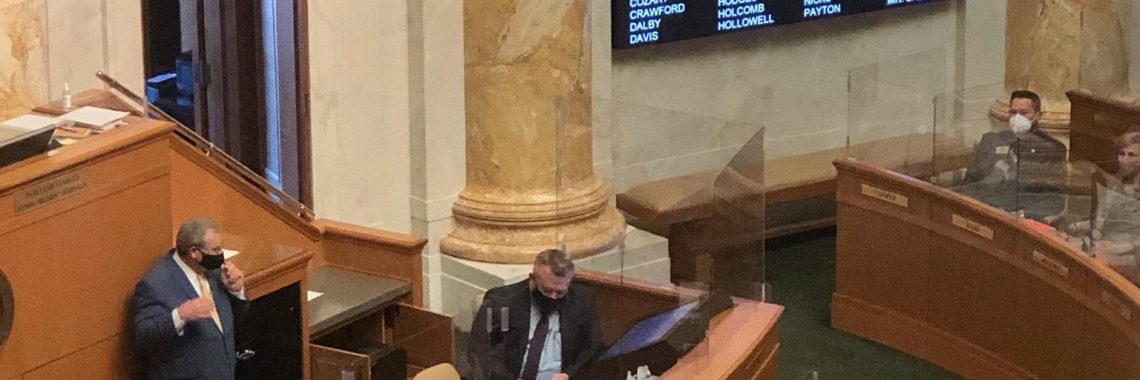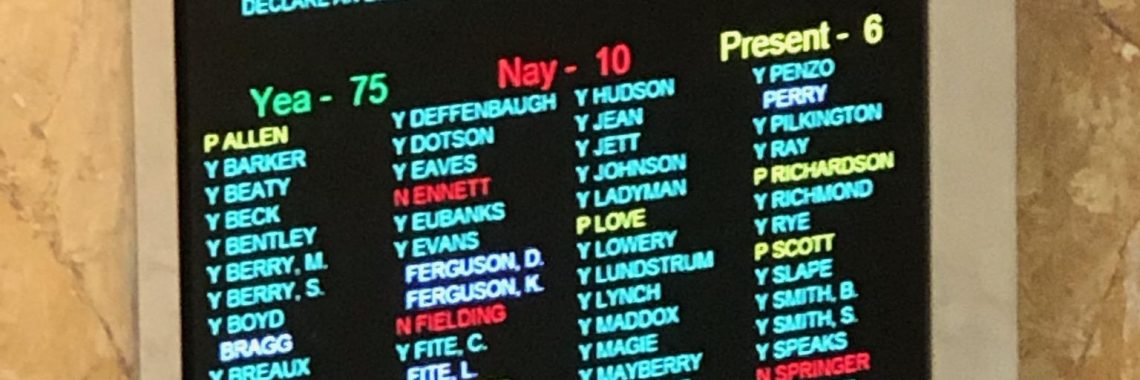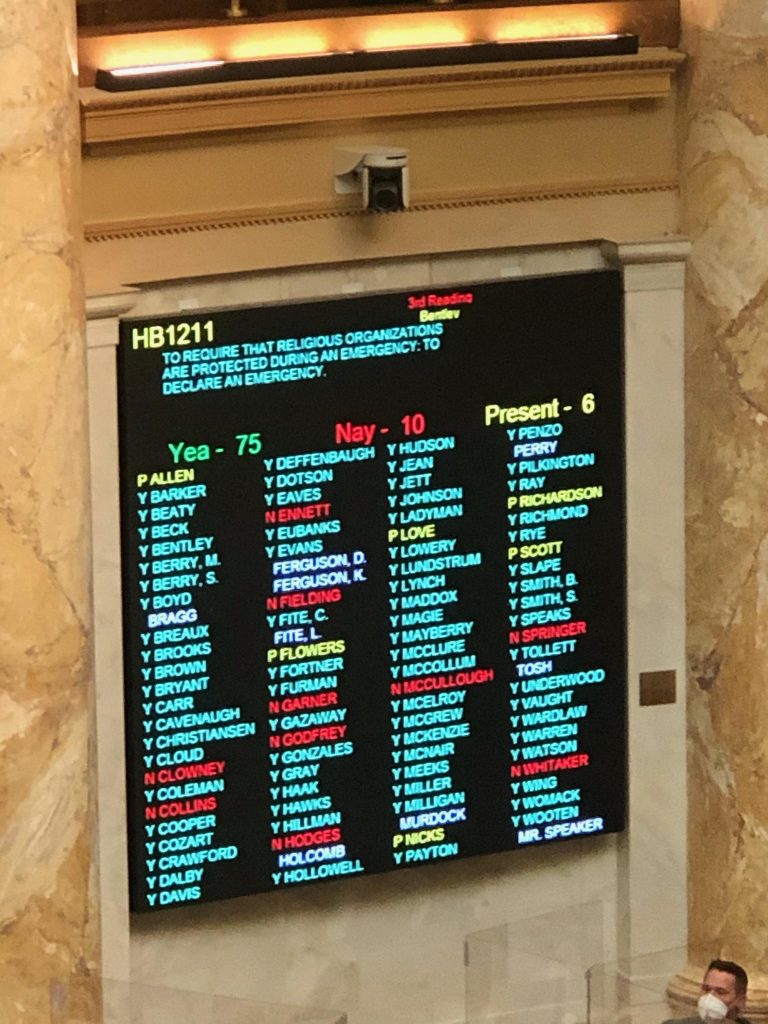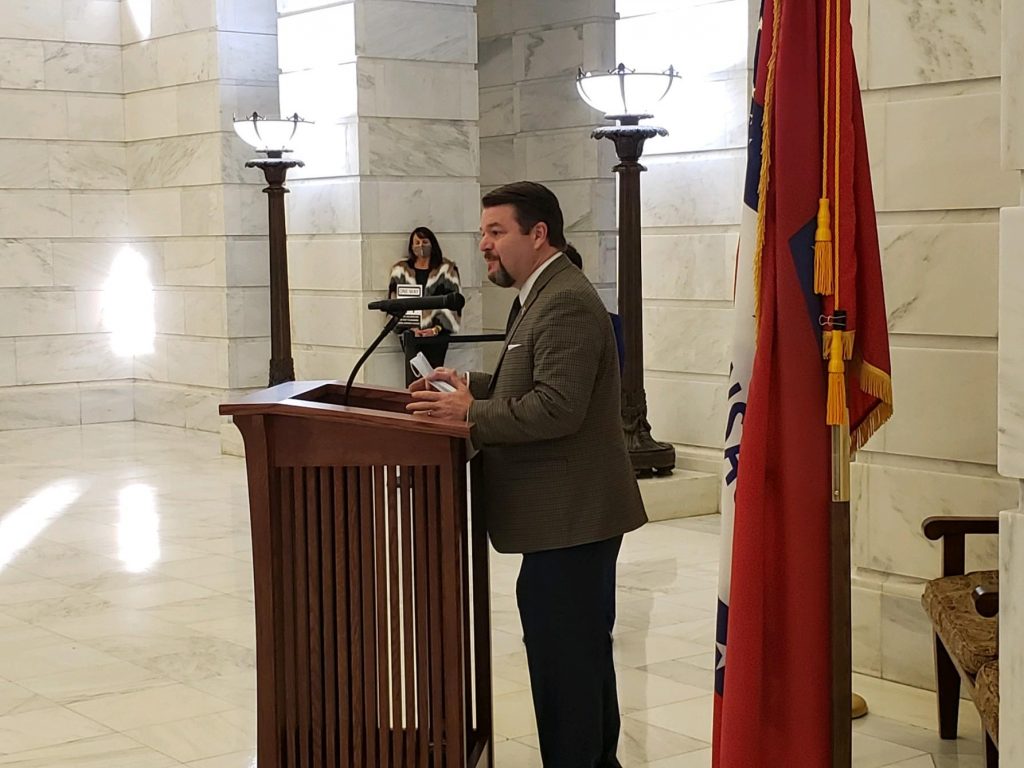A Quick Legislative Recap
We’re wrapping up another week at the Arkansas Legislature.
Here’s a quick overview of bills that are in play at the capitol.
Good Bills Filed
S.B. 6 (Prohibiting Abortion): This good bill by Sen. Jason Rapert (R – Conway) and Rep. Mary Bentley (R – Perryville) prohibits abortion in Arkansas, except in cases when the mother’s life is in jeopardy. Family Council fully supports this good bill. Family Council is working closely with Sen. Rapert to pass this good bill that could save the lives of thousands of children and give the courts an opportunity to overturn decades of bad, pro-abortion rulings. Read The Bill Here.
H.C.R. 1007 (Abortion): This good resolution by Rep. Jim Wooten (R – Beebe) and Sen. Jason Rapert (R – Conway) recognizes January 22 — the anniversary of the U.S. Supreme Court’s Roe v. Wade abortion decision — as “The Day of Tears” in Arkansas. The resolution acknowledges the 61 million of unborn babies killed in abortion in America over the past five decades, and encourages Arkansans to lower their flags to half-staff on January 22 to mourn the innocent children who have lost their lives. The resolution has passed the House and been sent to the Arkansas Senate. Read The Resolution Here.
S.B. 85 (Abortion): This good bill by Sen. Cecile Bledsoe (R – Rogers) and Rep. Joe Cloud (R – Russellville) requires an abortionist to show an ultrasound image of the unborn baby to the pregnant woman before an abortion. Currently, Arkansas law says an abortionist must offer to let the woman see the ultrasound image. Research indicates that some women are less likely to have an abortion once they see an ultrasound image of their unborn child. That means pro-life bills like S.B. 85 can help further decrease the number of abortions in Arkansas. Arkansas Right to Life is the chief proponent of this bill, and we fully support their efforts. Read The Bill Here.
H.B. 1116 (Simon’s Law): This good bill by Rep. Jim Dotson (R – Bentonville) and Sen. Bart Hester (R – Cave Springs) is named in honor of an infant in Missouri who died after doctors put a Do Not Resuscitate order on his chart without his parent’s knowledge or permission. If passed, it would protect children in Arkansas from being denied life support or having a DNR placed on their medical charts without parental consent. Read The Bill Here.
H.B. 1195 (Pro-Life): This good bill by Rep. Jim Dotson (R – Bentonville) and Sen. Bob Ballinger (R – Ozark) enacts legislation ensuring that women are offered information, assistance, and resources that could help them choose an option besides abortion. The bill has passed the House Public Health Committee. Read The Bill Here.
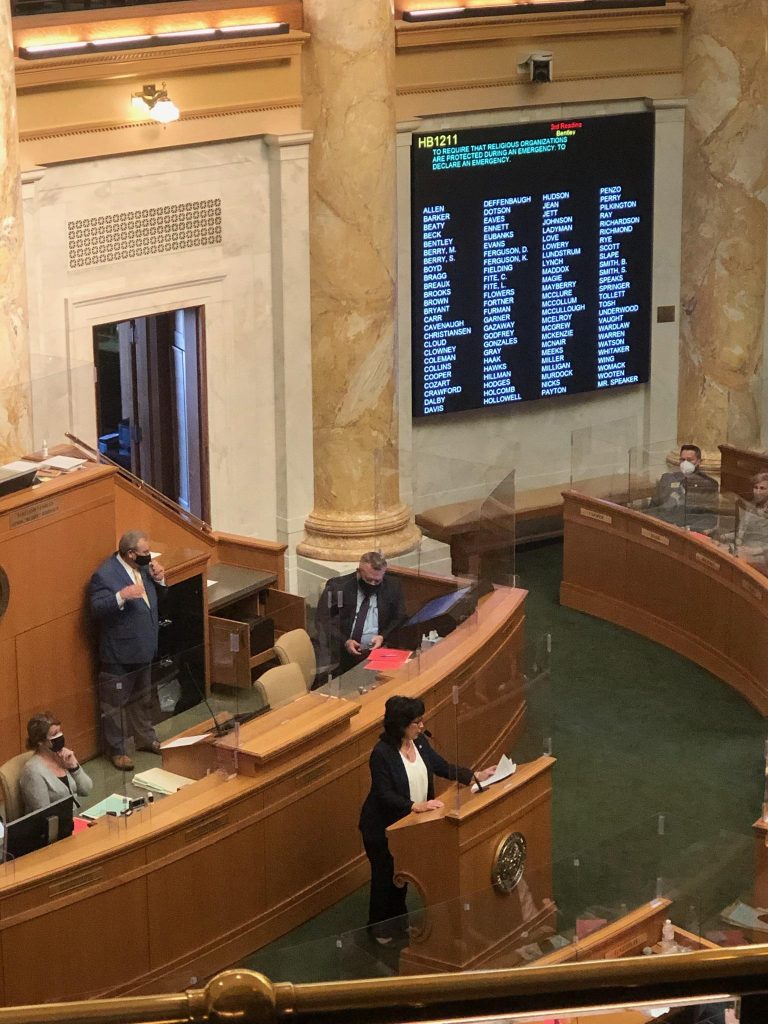
H.B. 1061 (No Patient Left Alone): This good bill by Rep. Julie Mayberry (R – Hensley) and Sen. Breanne Davis (R – Russellville) protects patients from being left alone and denied visitors in hospitals, nursing homes, and similar facilities. No one should be barred from being in the hospital with their dying child, spouse, or parent. This bill helps address that in Arkansas. Read The Bill Here.
H.B. 1160 (Used Car Tax): This good bill by Rep. John Payton (R – Wilburn) and Sen. Jason Rapert (R – Conway) would eliminate the tax on used cars sold for less than $7,500; the bill contains a provision that would take effect in 2023 eliminating the tax on used cars sold for less than $10,000. Family Council has worked for years to eliminate the used car tax, because it hurts single moms and middle class families who often can barely afford to buy a used vehicle, much less pay sales tax on one. Read The Bill Here.
H.B. 1211 (Religion is Essential): This good bill by Representative Mary Bentley (R – Perryville) and Senator Kim Hammer (R – Benton) recognizes that religion and religious organizations are essential in Arkansas. H.B. 1211 will protect churches and religious groups without hampering the government’s ability to respond during a pandemic. The bill passed the Arkansas House on Thursday. It now goes to the Senate State Agencies Committee. See how your state representative voted on the bill here. Read The Bill Here.
Bad Bills Filed
S.B. 3 (Enacting Hate Crimes Legislation): This bad bill by Sen. Jim Hendren (R – Gravette) and Rep. Fred Love (D – Little Rock) enacts hate crimes legislation by enhancing penalties for crimes committed against certain protected classes of people listed in the bill. The bill is virtually identical to H.B. 1020. Family Council has opposed hate crimes legislation for more than 20 years, and we oppose this bill as well. Read The Bill Here.
H.B. 1020 (Enacting Hate Crimes Legislation): This bad bill by Rep. Fred Love (D – Little Rock) and Sen. Jim Hendren (R – Gravette) enacts hate crimes legislation by enhancing penalties for crimes committed against certain protected classes of people listed in the bill. The bill is virtually identical to S.B. 3. Family Council has opposed hate crimes legislation for more than 20 years, and we oppose this bill as well. Read The Bill Here.
H.B. 1228 (Public Drinking): This bad bill by Rep. Lee Johnson (R – Greenwood) and Sen. Breanne Davis (R – Russellville) would let cities in dry counties to approve public drinking in “entertainment districts” if the city contains a private club that serves alcohol. Under Arkansas’ “entertainment district” law, alcohol can be carried and consumed outdoors on city streets and sidewalks around bars and restaurants, if approved by the city council. Read The Bill Here.

H.B. 1066 (Alcohol): This bill by Rep. Aaron Pilkington (R – Clarksville) would let microbrewery operators ship beer directly to private residences anywhere in the state of Arkansas or to residences in other states that allow direct shipment of alcohol. The bill may not contain sufficient safeguards to prevent alcohol from being delivered to someone who is under 21. Read The Bill Here.
H.B. 1148 (Alcohol): This bill by Rep. Frances Cavenaugh (R – Walnut Ridge) and Sen. Missy Irvin (R – Mountain View) overhauls Arkansas’ local option election law concerning alcohol. The bill reduces the threshold for taking a county wet or dry via a petition drive. Liquor stores in wet counties would be able to continue operating even if the county voted to go dry. The bill would make it easier for some cities or towns in a dry county to be wet while the rest of the county is dry. Read The Bill Here.
Other Bills We Are Watching
H.B. 1069 (Contraceptives): This bill by Rep. Aaron Pilkington (R – Clarksville) and Sen. Breanne Davis (R – Russellville) lets pharmacists dispense oral contraceptives to women without a prescription from a doctor. Family Council previously opposed this bill. However, Rep. Pilkington has filed amendments to the bill. His amendments address objections Family Council raised against H.B. 1069. At this time, Family Council is neutral on this bill. Read The Bill Here.
S.B. 32 (Alcohol): This bill by Sen. Jane English (R – North Little Rock) and Rep. Karilyn Brown (R – Sherwood) would let retail liquor permit holders — such as liquor stores — deliver alcoholic beverages to private residences in the county where the store is located. The bill may not contain sufficient safeguards to prevent alcohol from being delivered to someone who is under 21. The bill has passed the Arkansas Senate and been sent to the Arkansas House. See how your senator voted here. Read The Bill Here.
S.B. 76 (Alcohol): This bill by Sen. Lance Eads (R – Springdale) and Rep. Robin Lundstrum (R – Springdale) lets “excursion trains” serve alcoholic beverages to passengers. It has passed the Arkansas Senate and the Arkansas House. It has been sent back to the Arkansas Senate for concurrence in amendments made in the Arkansas House. See how your senator voted here. See how your representative voted here. Read The Bill Here.
H.B. 1324 (Substance Abuse Treatment for Pregnant Women): This bill by Rep. Jimmy Gazaway (R – Paragould) gives pregnant women priority in accessing substance abuse treatment programs that accept Medicaid. Read The Bill Here.

